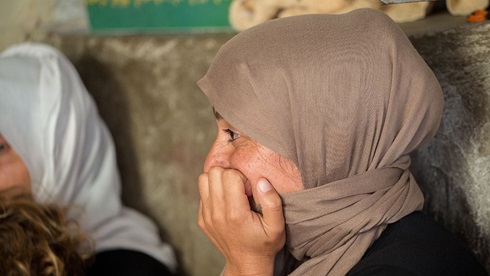A Burgeoning Crisis

I looked and saw all the oppression that was taking place under the sun: I saw the tears of the oppressed—and they have no comforter; power was on the side of their oppressors—and they have no comforter. (Ecclesiastes 4:1)
With these words, former U.S. Rep. Frank Wolf opened a three-day conference discussing the plight of Christians in the Middle East, which drew more than 300 attendees from 20 states and four countries. It was the second annual such conference organized by In Defense of Christians (IDC), a nonprofit, non-partisan group based in Washington, D.C.
Wolf, who championed pro-family legislation during his time in Congress, led a panel discussing the international response to the Christian genocide currently being waged by the Islamic State in Iraq and Syria (ISIS). Now a distinguished senior fellow at the 21st Century Wilberforce Initiative, Wolf reminded his audience that in 2012, President Obama stood in front of the Holocaust Memorial and vowed, “Never again.”
The promise has been forgotten. Genocide is occurring now—and it’s going unnoticed by the world, Wolf says.
“In 1950, there were 150,000 Jews in Iraq. As of January 2015, there were perhaps four,” he tells Citizen. “In 2003, there were 1.5 million Christians in Iraq. As of January, there were maybe 200,000.”
“Silence Makes Us All Complicit”
According to a Sept. 11 report, CNN, fully 50 percent of the population of Syria has been displaced due to a combination of civil war and the advance of ISIS, which has wreaked havoc on Christians, Yazidis and Kurds in the Nineveh Plains region of Iraq.
“The response of the United States and the international community has been completely inadequate,” says IDC Executive Director Kirsten Evans. “In some cases, these atrocities are met with silence. This silence makes us all complicit.”
In an area of the world where memories are long, Christians are very familiar with tragedy.
“The genocide began a hundred years ago,” Assyrian Christian activist Nahren Enweya tells Citizen, “long before ISIS.” But now, “not only is Christianity being lost, but humanity as well.”
Enweya moved to America at 6, after Saddam Hussein threatened her father. Last year, she received a phone call from an aunt in Mosul, saying, “We have been told to convert or be killed. “Tell the world what is happening!”
Within 24 hours, Enweya’s aunt, along with 200,000 other Christians, left their comfortable middle-class homes and fled into the desert with only what they could carry on their backs. Like hundreds of thousands of others, they haven’t returned.
Few Call It ‘Genocide’
According to the International Association of Genocide Scholars, the mass murders ISIS is committing among “Chaldean, Assyrian, Melkite Greek, Coptic Christians, Yazidis, Shia Muslims, Sunni Kurds and other religious groups meets even the strictest definition of genocide.”
In March, Antonio Guterres, the United Nations high commissioner for refugees, declared “it is reasonable to conclude” that what’s going on “may constitute genocide.”
But so far, U.S. government officials have refused to use that word. Nonetheless, Attorney General Loretta Lynch could investigate individual terrorists, and work with other countries to prosecute them abroad.
In a Sept. 8 letter from the 21st Century Wilberforce Initiative, Wolf asked her to do that. “If the Justice Department can figure out how to exercise extraterritorial jurisdiction over a case of sports corruption,” he wrote, “surely it can do the same for a clearly definable case of genocide.”
Robert Destro, a former member of the U. S. Commission on Civil Rights and founding director of the Interdisciplinary Program in Law & Religion at the Columbus School of Law in Washington, D.C., says the Obama administration’s avoidance of the word “genocide” may be rooted in fear of using military action to stop it. But there are other avenues the government could pursue.
“If the United States were to declare that genocide is going on in the Middle East,” he tells Citizen, “our government would be empowered to develop international criminal tribunals that could try ISIS leaders and soldiers for crimes committed under Syrian and Iraqi criminal law, as well as war crimes and crimes against humanity.
Or the administration could ask the United Nations to take steps to put an end to the slaughter, he says. “Our country could create and enforce safe havens that will allow the refugees to go back to their homes and live in safety.”
Taking Action
In addition to lobbying congressmen to pass a joint resolution urging the Obama administration to help stop the targeted killing of Christians in the Middle East, IDC announced it’s forming an action arm to train more than 120 IDC chapter leaders to keep up the pressure.
American Christians have been slow to engage on this issue. A panel called “Building Bridges Between Eastern and Western Christianity,” held on the final day of the conference, examined some of the reasons why.
“These ancient churches are denominations and ethnicities that most Americans are not familiar with,” said Mark Tooley, president of the Institute on Religion and Democracy and author of Taking Back the United Methodist Church. As a result, many Americans assume all Arabs are Muslim.
Nirmin Riad, founder of the group Coptic Orphans, agreed. “Egypt was predominantly Christian until 700 years ago,” she explained, “yet a Protestant international missionary organization called us an ‘unreached people group.’ ”
Throughout the conference, several speakers reminded people that Muslims also suffer under ISIS.
There are several things people of faith can do to help Middle Eastern Christians, says Travis Wussow, director of the Ethics and Religious Liberty Commission’s International Justice & Religious Liberty department—both personally and on a public-policy level.
“First, we need to believe that our prayers matter. We need to commit to praying for our brothers and sisters,” he tells Citizen. “Then we need to bear their burden. We must send our treasure to organizations that are doing great work on the ground. I’m not talking about our used T-shirts, I’m talking about serious cash.”
He recently visited a refugee camp in Lebanon housing 80,000 people. “There are only three schools there,” Wussow says. “That’s not good for anybody.” Over the last 18 months, Focus on the Family has been providing hands-on relief throughout the Middle East – raising more than $1 million to provide for refugees’ physical needs, as well as education initiatives for children. Corporately, Wussow says, Christians here can help raise awareness of what’s going on in the Middle East within their own denominations and communities by:
- getting aid to Syrians trapped in the country;
- aiding refugee camps;
- prioritizing and expediting resettlement plans for refugees;
- working with international organizations to preserve Christian culture; and
- creating safe zones for Christians and other minorities who want to return to the Nineveh Plains.
The stakes could not be higher; protecting Christians in the Middle East now could mean protecting Christians everywhere else later, since ISIS is bent not just on geographical, but theological, domination.
“When they’re done with us there,” Enweya says, “they will come for the rest of the world.”
FOR MORE INFORMATION:
To learn more about In Defense of Christians and how to become a member, visit idc.org.
To find out about Focus on the Family’s work in the Middle East or contribute to it, visit focusonthefamily.com/international. To learn more about genocide, visit genocidewatch.net.
To help your church to learn more about persecuted Christians around the world and how to help them, visit https://barnabasfund.org. Learn more about how radical Islamic ideology threatens Christians at westminster-institute.org.
United Nations’ Definition of Genocide
Article II of 1948 United Nations Convention on the Prevention and Punishment for the Crime of Genocide defines genocide as:
Any of the following acts committed with intent to destroy, in whole or in part, a national, ethnical, racial, or religious group, such as
- killing members of the group;
- causing serious bodily or mental harm to members of the group;
- deliberately inflicting on the group conditions of life calculated to bring about its physical destruction in whole or in part;
- imposing measures intended to prevent births within the group;
- forcibly transferring children of the group to another group.
ABOUT THE AUTHOR
Related Posts

Is New Paganism Actually Pagan?
May 30, 2023

Daily Headlines | Thursday October 7, 2021
October 7, 2021

Daily Headlines | Wednesday October 6, 2021
October 6, 2021

Daily Headlines | Tuesday October 5, 2021
October 5, 2021
